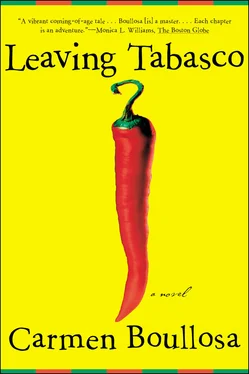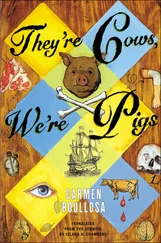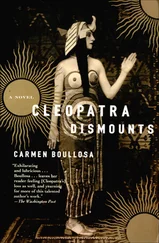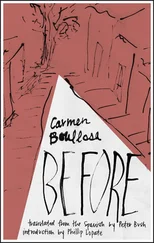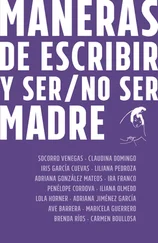“Tell me the weight and I’ll make them for you. Otherwise, forget it.”
Beside him, an equally fat man, reclining on the floor, was kneading with his feet an enormous ball of dough on a huge tray. It wobbled around, swaying backward and forward, like something alive.
A little beyond him a third man, skinny but dressed like the other two and of the same color, was shaping the dough into loaves on another huge tray. Everything there was white too. God knows how the bread got its fancy colors into it.
“But I don’t know how much they weigh.”
“You don’t know, you don’t get the loaves. As simple as that.”
Then I had an inspiration.
“You know the loaves for the nuns, the ones with the cross on top? Make me four of those.”
“With crosses as well?”
“No. Put a G for Gustavo on them.”
“What’s a G ? I don’t know my alphabet.”
The floor was as pure white as driven snow. I crouched down and traced a capital G .
“Four loaves?” he asked.
“Right. Four.”
“Four loaves coming up, blondie, in time for lunch. I’ll get them ready right now and put that snake-thing on top, all curly. Or rearing, you said.”
“Psst, pssst! Got anything to lend me, dearie?” shouted another man who was kneading with virile energy a thick welter of dough that had a yellowish tinge to it. He was doing it with his arms, chest, and one thigh completely sunk in the dough. For some reason I was reminded of the curate jammed up against my mother’s buttocks. There was a striking similarity between the two things. I was so overcome with shame I hadn’t the presence of mind to answer the man or even ask what he wanted me to lend him. I said a timid thank-you to the other fellow and took off fast. I shot up the stairs as if the men were chasing me.
When I got out to the street, I realized how appalling the heat had been down in that basement. In comparison the air up above was cool. The light too was so radically different from that down below that it was hard to believe it belonged to the same world. I rubbed my eyes and took a deep breath before starting my walk home.
On my way through the market I bumped into Grandma. Behind her toddled two boys laden down with shopping bags filled to the brim. One of them also carried an outsized hen, dead and featherless. Normally we never bought them in that condition. Doña Luz used to kill and pluck them herself, but now there was no Doña Luz and today we were in a hurry. The boy had fastened it with string around his waist in order to leave his hands free. He wasn’t even as tall as I was. The hen’s head bumped against his shins with every step he took. He smiled at me without embarrassment. His teeth were completely brown, like half-chewed caramels. His feet were bare. The other boy was taller than us, had his hair clipped down to his scalp, and also had a burden secured around his waist, a bunch of beetroots.
“What’s that, Grandma?”
“Sugar beets.”
“But you never buy them.”
“Well, I did today. Get a move on. Don’t block my way.”
“I put in the order for the bread, Grandma. I asked them to put a G where they put a cross for the nuns.”
“Can’t you do anything right? Even when you get explicit instructions?”
I didn’t bother to explain why I’d been driven to make the order this way. If she didn’t like it, she could lump it. I was sure that Uncle Gustavo would love the G ’s, and that was what counted. She could get as nasty with me as she liked. Instead of answering her, I started to joke around with the boys.
“You’ve got teeth made of gold, right?” I said to the kid with rotten teeth.
The two boys laughed. Then I tried again. “Is that hen tickling your belly with its claws?” But Grandma grabbed me by the ear and said into it, “You don’t talk to Indians. Have you got that? Okay?” And she gave me a sharp pinch.
We walked on to the house without a further word. Then she, Mama, and I went to hear Mass. But Grandma didn’t join us for breakfast with the priest. She had to busy herself with the preparations for lunch. She invited the priest to drop in and eat with us, and he accepted gladly.
We walked over to the doctor’s house and invited him as well. The rest of his family had gone off to Mexico City because somebody was marrying somebody there, and he too accepted gladly.
From there we hurried off to buy flowers, purplish gladioli with long stems, and back in the house we arranged them very prettily.
Mama slipped some worn table mats under the flower vases. The vases seemed to float, as usual, about a finger’s breadth above the furniture, but they didn’t chime in the wind the way Grandma’s collection of bells did, responding to its gusts and even to the footsteps of anybody going by. If the living room was open because it was Saturday, the day for general cleaning, I used to jump up and down in front of the bells till their clappers tinkled. But on the rare occasions that we were entertaining people from out of town, the flower vases, the bells, and the porcelain Lladro figurines were placed on top of the furniture. Even the Virgin from the altar at the doorway came in and set her sacred feet in the wall niche.
In some other houses in town the sculpted figures insisted on lying flat, snuggling down, as if tired out by the endless heat. At the priest’s place, the piggy bank on the windowsill above the kitchen sink was always tilted, with its front feet down the sloping ledge and its back feet raised. Our church gave us the feeling of a solar plexus in the process of breathing. All the images and the candlesticks rocked back and forth.
If invading forces had wanted to capture us by surprise, they never would have succeeded. Inside our houses we would have felt them the moment they set their first treacherous foot on our soil; the force of their arrival would have been transmitted to our ornaments and religious statues.
Once we’d organized the flower vases, we laid the table, putting on it a crocheted tablecloth made by Grandma, her wedding crockery, the silver cutlery, and the cut-glass wineglasses. We’d barely got the napkins in place when we heard Uncle Gus’s car arriving. Now he was driving a fabulous, flaming-red Mustang, a model never before seen in Agustini, but God knows how it had survived all the potholes on the highway. He also had a camera with him and had us all come out for a photo.
“This is before I introduce anybody to anybody,” he said, arranging where we should stand. “A photo of total strangers.”
Just as he was about to take it, he asked, “Where’s Doña Luz? I can’t take a photo without her. Get her out here.”
“Well, that’s just not going to be possible,” said Grandma. “Go ahead. Take the photo.”
He didn’t ask us to say “cheese,” to get us all smiling, but just snapped us. I’ve still got that photo, I brought it to Germany with me. Behind us you can see kids milling around, their bellies on display, and youngsters from the town intrigued by the car and indifferent to us.
“What about Doña Luz, Mama?” asked Gus.
“She left us, son. Two weeks ago, she passed on to a better life.”
“How come you never told me? I’d have come to the funeral.”
“There wasn’t a funeral,” I interrupted.
His sad features registered astonishment.
“What did you say? No funeral?” he asked in slow, deliberate tones. “Why was there no funeral?” he added even slower. “She was one of the family, Mama. If it was a matter of money, you’d only to ask.”
“What are you talking about?” said Grandma. “That wasn’t the reason. In this town not even the most miserable wretch goes to a better life without flowers, a coffin, and tamales.”
Читать дальше
